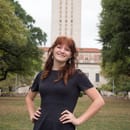The University of Texas bolsters over 51,000 students, every single one coming from diverse backgrounds and living situations. The university claims to “embrace and encourage diversity”, since it strives to “create an inclusive community that foster an open and supportive learning, teaching, and working environment.” However, one may wonder how much the university lives up to that claim in terms of supporting minority students.
The 2018 student government campaign Guneez & Hannah broadcasted such a sentiment.
On Guneez Ibrahim’s campaign website, Ibrahim writes, “I am a first generation American from a Muslim-Pakistani family that grew up in South Louisiana. I suspect that sentence alone can conjure up some ideas of how my ethnic background affected my upbringing. A major hindrance in my life has been statements like I can’t so that and I don’t belong here.”
Ibrahim and Hannah McMorris ran a campaign centered on inclusivity and diversity, both eager to be the first Muslim woman president and black woman vice president ticket. Ibrahim’s campaign brought to light an infrequently talked about minority group on campus: Muslims.
According to the 2010 US Religious Census, Texas has the second largest Muslim population in the United States. Houston in particular has the largest Muslim population in Texas. However, with only 1.2 percent of Houston’s population practicing Islam, Muslims can easily claim a minority status.
Muslim students on the University of Texas campus, though, rarely get much consideration as minorities in need of inclusion and protection by the university and student body.
Mahera Badat, a senior Psychology and Islamic Studies major, is a Muslim woman from Houston, and she describes the success and failures of the university in detail.
As for the successes of the university, for Mahera, the Islamic Studies major is a useful tool to explore Muslim voices and the Muslim religion. “We learn [Islam] from a very academic standpoint, because you get to learn the history of the religion, where it started.” The university offers a vast array of options in order to better understand Islam and Islamic cultures holistically.
Mahera even points to the holistic approach of the major as a source to strengthen her religious beliefs. “I feel like I understand [Islam] and I can actually speak on it. At first, I thought ‘this is what I believe’ or ‘this is just what I practice’, but now I can talk about the beliefs with so much more insight… [The major] helped me solidify my beliefs. Now I know why I believe it,” she explains.
Mahera finds herself even explaining why she is a Muslim in the classes directly. The Islamic studies classes offer students opportunities to genuinely seek out more information about the religion and the people who practice the religion without any popular opinion biases perpetrated by the media.
However, she recognizes that the university needs to do more in terms of representing Islam and accommodating the struggles of Muslim students. To her, the university is not inclusive and it only pays lip service to be inclusive.
Discrimination against Muslim students is rampant on and off campus. Even though Mahera said she has not been assaulted, she has been a victim of micro-aggressions by professors and students alike.
“I’ve been asked, ‘Oh, why do you wear [a hijab]?’ and ‘Are you oppressed?’” Mahera explained. Often, someone will be impressed that she speaks English so well, even though English is her first language.
Students often perform micro-aggressions, whether knowingly or unknowingly, through uncomfortable staring, as if Muslim students are a novelty. White students in particular will preform these micro-aggressions to an extent that they are unaware minority students are uncomfortable.
Mahera offers a recent experience of an encounter where this is the case. “On Friday, I went to Cold Cookie Company, and there was this guy and he was chilling with his friends. He just looked at me top to bottom and it was really uncomfortable. He looked at me for a while, at my face and scarf. I just thought, ‘get your ice cream and leave’, and so I got my ice cream and left.”
Mahera mentioned that instances such as these make her feel not only uncomfortable for her own safety, but her friends’ safety, as well. In fact, 38% of Muslim people are more likely to be fearful for their own personal safety or the safety of their friends’ and family from white supremacist groups as a result of the 2016 elections. Such percentages drastically compare to 11% of Protestants and 16% of people with no affiliated religion.
The fear from Muslim people are not unfounded, either. 60% of the reported religious-based discrimination came from Muslim communities.
The story is even worse for Muslim women, in comparison to Muslim men. Muslim women in particular are more likely than Muslim men to report religious discrimination this past year, and Muslim women are more fearful for their safety than Muslim men from white supremacist groups.
Wearing a hijab also increases the discrimination Mahera and other Muslim women face. Since the scarf is wore by Muslim women, the hijab acts as a signifier of a Muslim woman to other individuals. Hijab wearers receive more questions related in religion and looks than non-hijab wearers. However, women who do not wear hijabs are still discriminated against, nonetheless.
Professors also contribute to the problem, suggesting that Muslim discrimination is more of a systemic issue that the university fails to address. “With some non-Muslim professors, they treat you like you aren’t smart enough and kind of put you down. I felt it happened with three different professors. I didn’t feel comfortable or welcomed,” Mahera says.
Outside of confronting these professors themselves, Mahera expressed that there were not many avenues put into place by the university that made her feel like she could confidently remedy the discrimination.
Mahera insisted that the university has to be clearer about the procedures to handle systematic discrimination. While she was sure that these procedures existed, she and many other students do not know what they were and where to find them.
Additionally, the university does not take much action in addressing and listening to minority struggles. Mahera suggested that student committees should be a part of administrative efforts to increase diversity, with students representing various minority groups. Administration needs to be constantly reminded of what affects all minorities, and not just certain minority groups.
Transparency is also an issue with the university. Whenever the university addresses a minority issue, administration should not simply send out a single email to the entire student body. Mahera thought that these were reactive measures by the university to address campus-wide discrimination and wrongs, but indicated little promise for proactive solutions.
A university effort that could increase awareness of Muslim issues and the Islam religion, decreasing confusion about the religion and discrimination against Muslim students could be religious town halls. Mahera talked fondly of interfaith efforts throughout the campus, not just for Islam, but all religions.
Reducing the foreignness of Islam can have positive effects for Muslims and non-Muslims alike, particularly because Islam is not all that foreign from Judeo-Christianity and other religions.
Mahera, after all, is a Muslim for similar reasons why someone might be another religion. When asked what Islam meant to her, she responded, “To me, it means peace, honestly. To the root [of the word], one of the meanings is ‘peace’, but specifically why it means peace to me is because I know that no matter what I am going through, when I pray or sit and talk to God or listen to a recitation, [Islam] will automatically calm me down.”
Reducing the foreignness of Islam should not only be a university effort, though. Students also need to be more active in understanding Islam. Mahera points out that there are many resources already available to students to promote Islamic exposure, but few students know where to find these resources, either because the university does not help students find them or because students do not look to find them themselves.
Students can reach out to local mosques, like the Nueces Mosque, which also hosts an open house at the beginning of every semester and community events throughout the year. The Texas Muslim Student Association (MSA) is also an excellent resource to learn more about Islam.
At the end of the day, though, interested students should just talk to Muslim individuals and their Muslim friends. Mahera repeatedly claimed that she was open to talking about her faith with other people. She consistently reinforced the idea that taking the initiative to start a conversation matters.
Listening to Muslim voices is the best way to understand the Muslim faith and cultural challenges, and Mahera, Guneez, and many other Muslims are amazing testaments to that.
Pictured: Mahera Badat


